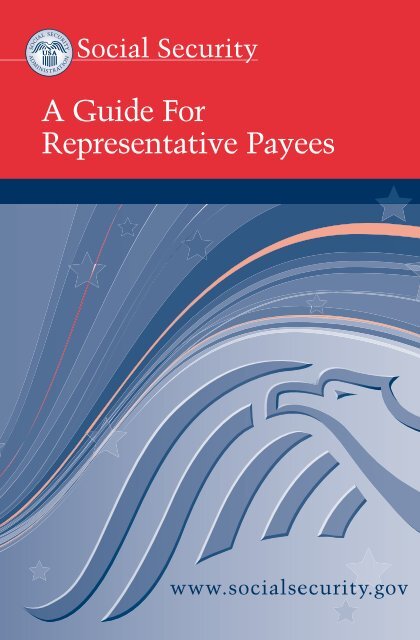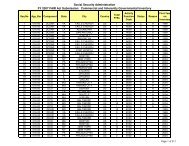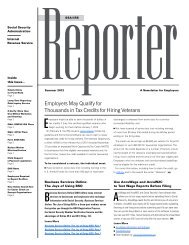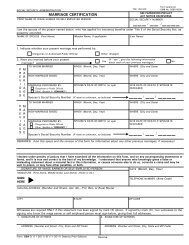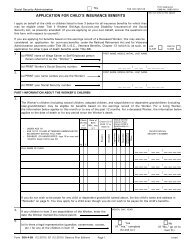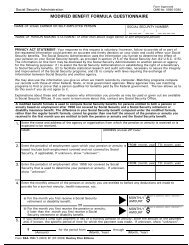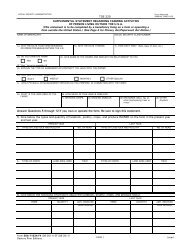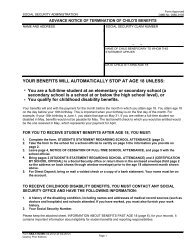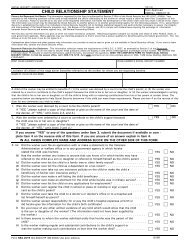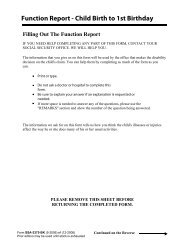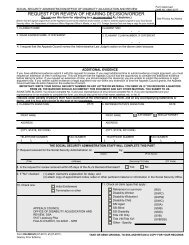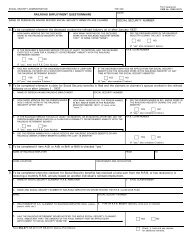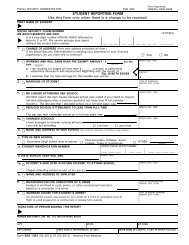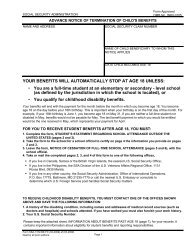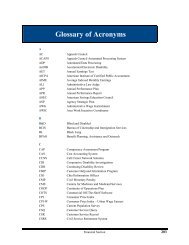A Guide For Representative Payees - Social Security
A Guide For Representative Payees - Social Security
A Guide For Representative Payees - Social Security
You also want an ePaper? Increase the reach of your titles
YUMPU automatically turns print PDFs into web optimized ePapers that Google loves.
A <strong>Guide</strong> <strong>For</strong><br />
<strong>Representative</strong> <strong>Payees</strong>
Contact <strong>Social</strong> <strong>Security</strong><br />
Visit our website<br />
Our website, www.socialsecurity.gov, is a valuable<br />
resource for information about all of <strong>Social</strong> <strong>Security</strong>’s<br />
programs. At our website you also can:<br />
• Apply for certain kinds of benefits;<br />
• Get the address of your local <strong>Social</strong> <strong>Security</strong> office;<br />
• Request a <strong>Social</strong> <strong>Security</strong> Statement or a<br />
•<br />
replacement Medicare card; and<br />
Find copies of our publications.<br />
Call our toll-free number<br />
In addition to using our website, you also can<br />
call us toll-free at 1-800-772-1213. We treat all calls<br />
confidentially. We can answer specific questions from<br />
7 a.m. to 7 p.m., Monday through Friday. We can<br />
provide information by automated phone service 24<br />
hours a day. If you are deaf or hard of hearing, you may<br />
call our TTY number, 1-800-325-0778.<br />
We also want to make sure you receive accurate and<br />
courteous service. That is why we have a second <strong>Social</strong><br />
<strong>Security</strong> representative monitor some telephone calls.
What’s inside<br />
Introduction . . . . . . . . . . . . . . . . . . . . . . . . . . . .4<br />
Helping you manage your<br />
new responsibility . . . . . . . . . . . . . . . . . . . . . . .5<br />
How you must use monthly benefits . . . . . . .6<br />
How to handle a large payment of<br />
past benefits . . . . . . . . . . . . . . . . . . . . . . . . . . . .7<br />
Income and Expenses Worksheet . . . . . . . . .10<br />
How funds should be held . . . . . . . . . . . . . . .13<br />
Changes to report . . . . . . . . . . . . . . . . . . . . . .16
4<br />
Introduction<br />
More than seven million people who get monthly<br />
<strong>Social</strong> <strong>Security</strong> or Supplemental <strong>Security</strong> Income (SSI)<br />
benefits need help managing their money.<br />
After a careful investigation, we appoint a relative,<br />
friend or other interested party to serve as the “representative<br />
payee.” This means that, if you agree to be a<br />
representative payee, we pay you the person’s benefits<br />
to use on his or her behalf.<br />
In agreeing to serve as a representative payee, you<br />
have taken on an important responsibility (one that<br />
can make a positive difference in both the beneficiary’s<br />
life and your life).<br />
With certain exceptions, a payee may not collect<br />
a fee for services provided to the beneficiary. Unless<br />
<strong>Social</strong> <strong>Security</strong> authorizes you to collect a fee for<br />
providing services, or you are the legal guardian who<br />
has been authorized by a court to charge a guardian<br />
fee, you may not collect a fee from the beneficiary.<br />
This booklet provides basic information on how<br />
to be a representative payee and is not intended to<br />
answer all questions. <strong>For</strong> specific information about<br />
your situation, you should talk with a <strong>Social</strong> <strong>Security</strong><br />
representative at your local <strong>Social</strong> <strong>Security</strong> office.
Helping you manage your new responsibility<br />
As a representative payee, you must know what the<br />
beneficiary’s needs are so you can decide how benefits<br />
can best be used for his or her personal care and wellbeing.<br />
This is especially important if the beneficiary<br />
does not live with you.<br />
Each year, <strong>Social</strong> <strong>Security</strong> will ask you to complete<br />
a form to account for the benefits you have received.<br />
<strong>Social</strong> <strong>Security</strong> will mail you a form. You can either<br />
fill out the form and return it to <strong>Social</strong> <strong>Security</strong> or<br />
go online at www.socialsecurity.gov/payee to file<br />
the report. You can use the worksheet in the center<br />
of this booklet to keep track of what you spend (see<br />
sample form on pages 10-11).<br />
As a representative payee, you also will need to<br />
tell <strong>Social</strong> <strong>Security</strong> about changes that may affect<br />
the beneficiary’s eligibility. The changes are listed<br />
on pages 16-17.<br />
Remember, the law requires representative payees to<br />
use the benefits properly. If a payee misuses benefits,<br />
he or she must repay the misused funds. A payee<br />
who is convicted of misusing funds may be fined and<br />
imprisoned.<br />
NOTE: A payee is appointed to manage <strong>Social</strong><br />
<strong>Security</strong> funds only. A payee has no legal authority to<br />
manage non-<strong>Social</strong> <strong>Security</strong> income or medical matters.<br />
Family members often use a “power of attorney”<br />
as another way to handle a family member’s finances.<br />
<strong>For</strong> <strong>Social</strong> <strong>Security</strong> purposes, a “power of attorney” is<br />
not an acceptable way to manage a person’s monthly<br />
benefits. <strong>Social</strong> <strong>Security</strong> recognizes only a representative<br />
payee for handling the beneficiary’s funds.<br />
5
6<br />
A special note about children who get<br />
Supplemental <strong>Security</strong> Income (SSI) payments<br />
If you are a payee for a child receiving SSI payments,<br />
you will be required to obtain treatment for the child’s<br />
medical condition when treatment is determined to<br />
be medically necessary. If you do not obtain medical<br />
treatment for the child, <strong>Social</strong> <strong>Security</strong> may appoint a<br />
new representative payee.<br />
How you must use monthly benefits<br />
First, you must make sure the beneficiary’s dayto-day<br />
needs for food and shelter are met. Then, the<br />
money can be used for any of the beneficiary’s medical<br />
and dental care that is not covered by health insurance,<br />
and for personal needs, such as clothing and recreation.<br />
If there is money left after you pay for the beneficiary’s<br />
needs, it must be saved, preferably in an interestbearing<br />
account or U.S. Savings Bonds.<br />
If the beneficiary is in a nursing home or other<br />
institution, you should use the benefits to pay the<br />
usual charges for care. In this case, you should set<br />
aside a minimum of $30 each month to be used for the<br />
beneficiary’s personal needs.<br />
Also, if the beneficiary lives in an institution<br />
and is eligible for Medicaid or is a member of a<br />
family that receives payments from the Temporary<br />
Assistance for Needy Families program, you should<br />
contact your local <strong>Social</strong> <strong>Security</strong> office about using<br />
the beneficiary’s <strong>Social</strong> <strong>Security</strong> benefits to support<br />
the family.<br />
As a general rule, you may not take a fee from the<br />
beneficiary’s funds for your services as a representative<br />
payee. If you have questions about this, contact your<br />
local <strong>Social</strong> <strong>Security</strong> office.
How to handle a large payment of<br />
past benefits<br />
Sometimes benefits take a while to be approved.<br />
When this happens, back benefits may be paid all at<br />
once, in a large payment. First, you must spend the<br />
money on the beneficiary’s current needs such as<br />
rent and a security deposit, food or furnishings. After<br />
these expenses are paid, you may spend the money to<br />
improve the beneficiary’s daily living conditions or for<br />
better medical care. It is important that you spend the<br />
money wisely. You should keep in mind that the money<br />
must be used in the beneficiary’s best interests. If there<br />
is money still left over, it must be saved, preferably in<br />
U.S. Savings Bonds or an interest-paying bank account,<br />
insured under either federal or state law.<br />
Improve daily living conditions<br />
After you have provided for the beneficiary’s basic<br />
needs, you may spend the money to improve the<br />
beneficiary’s daily living conditions or for better<br />
medical care. You may decide to use the beneficiary’s<br />
funds for major health-related expenses, if they are<br />
not covered by the beneficiary’s health insurance.<br />
Examples of these expenses are reconstructive dental<br />
care, a motorized wheelchair, rehabilitation expenses or<br />
insurance premiums.<br />
You could use the money to arrange for the<br />
beneficiary to go to school or get special training.<br />
You also could spend some of the money on the<br />
beneficiary’s recreational activities, such as movies,<br />
concerts or magazine subscriptions.<br />
7
8<br />
Special purchases<br />
You may want to make some of the following<br />
special purchases for the beneficiary.<br />
• A home—You can use funds as a down payment, and<br />
you can use some of the money to make payments<br />
on a house owned by the beneficiary.<br />
• Home improvements—You can pay for renovations<br />
that make the beneficiary’s home safer and more<br />
accessible; for example, installing a wheelchair ramp<br />
or widening doorways to accommodate a wheelchair.<br />
• Furniture—You can buy furniture for the<br />
beneficiary’s personal use, as well as items that may<br />
be shared with other members of the household,<br />
such as a television.<br />
• A car—You can use funds as a down payment, and<br />
you can use some of the money to make monthly car<br />
payments as long as the car is used for and owned by<br />
the beneficiary.<br />
If you are not sure whether it is okay to use the<br />
money for a specific item, (for example, paying a<br />
bill the beneficiary owed before you became payee),<br />
contact your local <strong>Social</strong> <strong>Security</strong> office before you<br />
spend the money.
A special note about SSI beneficiaries<br />
To continue receiving SSI, a beneficiary must not<br />
have resources worth more than $2,000 ($3,000 for<br />
couples). Although not all resources are counted, some<br />
of the items you may buy with the money could be<br />
worth so much that the beneficiary would be ineligible<br />
for SSI benefits. Any money you do not spend<br />
could also count as a resource. You should check with<br />
your local <strong>Social</strong> <strong>Security</strong> office before making a major<br />
purchase for an SSI beneficiary.<br />
9
10<br />
Income and Expenses Worksheet<br />
Expenses for clothing,<br />
medical/dental,<br />
personal items,<br />
recreation,<br />
miscellaneous<br />
Expenses for food<br />
and housing<br />
Amount of <strong>Social</strong><br />
<strong>Security</strong> or SSI<br />
benefits received<br />
Month and year
$_________________________<br />
Totals for report period $_________________________ $_________________________<br />
Put this figure on line 3C<br />
of the <strong>For</strong>m SSA-623<br />
Put this figure on line 3B<br />
of the <strong>For</strong>m SSA-623<br />
$_________________________<br />
Show the amount of any benefits you saved for the beneficiary, including any<br />
interest earned<br />
Put this figure on line 3D<br />
of the <strong>For</strong>m SSA-623<br />
<strong>For</strong> additional worksheets, please copy this page before you use it or<br />
contact your local <strong>Social</strong> <strong>Security</strong> office to obtain copies.<br />
11
12<br />
A special note about blind or disabled<br />
children receiving SSI<br />
Sometimes, blind or disabled children will receive<br />
large, past-due SSI payments covering more than six<br />
months of benefits. Usually, these payments must go<br />
directly into a separate banking account. We call this<br />
a “dedicated account” because funds in this account<br />
may be used only for certain expenses, primarily<br />
those related to the child’s disability. The dedicated<br />
account must be kept separate from any other savings<br />
or checking account set up for the beneficiary.<br />
Except for certain subsequent past-due payments, no<br />
other funds may be commingled into the account,<br />
and money in the dedicated account is not countable<br />
as a resource. Interest earned on the money also is<br />
not counted as income or as a resource. Money in a<br />
dedicated account must be used only for the following<br />
expenses:<br />
• Medical treatment and education or job<br />
skills training;<br />
•<br />
•<br />
Personal needs assistance related to the child’s<br />
disability—special equipment, housing modification<br />
and therapy or rehabilitation; or<br />
Any other item or service related to the child’s<br />
disability that we determine to be appropriate,<br />
such as legal fees incurred in establishing the<br />
child’s claim for benefits.<br />
You should first get approval from us for these<br />
kind of expenses.<br />
You must keep a record of all money taken from this<br />
account and receipts for all items or services bought,<br />
because we will review these records at least once a<br />
year. If you knowingly use money from the dedicated<br />
account for anything other than the expenses shown<br />
above, you must repay us from your own funds. If you<br />
have questions about dedicated accounts, contact us.
How funds should be held<br />
It is a good idea to ask us to directly deposit monthly<br />
benefits into a bank account. We recommend that<br />
you hold benefits in a checking or savings account<br />
to protect against loss or theft. Also, do not mix the<br />
beneficiary’s funds with your own or other funds.<br />
If any money is left after meeting the beneficiary’s<br />
day-to-day and personal needs, it must be saved. The<br />
preferred ways of saving is U.S. Savings Bonds or an<br />
interest-paying bank account that is insured under<br />
either federal or state law. Interest earned belongs to<br />
the beneficiary.<br />
To protect the beneficiary’s funds, the checking or<br />
savings accounts title must reflect the beneficiary’s<br />
ownership of the funds and your relationship as a<br />
fiduciary (financial agent). Neither the representative<br />
payee nor any other third party can have ownership<br />
interest in the account. The beneficiary must never<br />
have direct access to the account. Any account title<br />
(under state law) that shows beneficiary ownership<br />
of the account with you as fiduciary is acceptable.<br />
Do not use joint accounts. Here are two ways we<br />
recommend to title the accounts:<br />
• “(Beneficiary’s name) by (your name),<br />
representative payee.”<br />
•<br />
“(Your name), representative payee for<br />
(beneficiary’s name).”<br />
Your bank will provide help if you have additional<br />
questions.<br />
13
14<br />
An exception for parents who are<br />
representative payees<br />
A common checking account for all family<br />
members living in the same household who receive<br />
benefits may show a parent as the owner of the<br />
account. Children’s savings, however, must be held<br />
in a separate savings account for each child, with<br />
the child’s name shown as the owner of the account.<br />
Keeping records<br />
As a representative payee, you are responsible for<br />
keeping records and reporting on how you spend the<br />
benefits by completing a <strong>Representative</strong> Payee Report<br />
(<strong>For</strong>m SSA-623, SSA-6230 or SSA-6233). The appropriate<br />
form will be mailed to you about once a year. You also can<br />
file the report online at www.socialsecurity.gov/payee.<br />
You must complete the report even if you are the<br />
beneficiary’s legal guardian.<br />
You may choose to use the worksheet in the<br />
center of this booklet to help you keep track of<br />
the money you spend. When you need to fill out<br />
the <strong>Representative</strong> Payee Report, you can add the<br />
amounts in each column of your worksheet and<br />
put the totals on the accounting form. If you need<br />
additional worksheets, call 1-800-772-1213 (TTY<br />
1-800-325-0778).<br />
Paying income tax<br />
Some people who get <strong>Social</strong> <strong>Security</strong> will have<br />
to pay federal income tax on their benefits. At the<br />
beginning of each year, <strong>Social</strong> <strong>Security</strong> will mail you<br />
a <strong>Social</strong> <strong>Security</strong> Benefit Statement (<strong>For</strong>m SSA-1099)<br />
that shows the amount of benefits paid during the<br />
previous year. Give this statement to the person who<br />
prepares the beneficiary’s tax returns to use in figuring<br />
out if any tax must be paid on the beneficiary’s <strong>Social</strong><br />
<strong>Security</strong> benefits.
Organizations that serve as payees<br />
Sometimes nursing homes or other organizations<br />
place funds for several beneficiaries in a single checking<br />
or savings account. This is called a “collective<br />
account.” This is usually acceptable, but special rules<br />
apply to these accounts:<br />
• The account title must show that the funds belong to<br />
the beneficiary and not the representative payee;<br />
• The account must be separate from the<br />
organization’s operating account;<br />
• Any interest earned belongs to the beneficiaries;<br />
•<br />
•<br />
•<br />
There must be clear and current records showing<br />
the amount of each beneficiary’s share and proper<br />
procedures for documenting credits and debits; and<br />
The account and supporting records must be made<br />
available to us when we ask for them.<br />
Some examples of collective account titles are:<br />
“Sunnydale Nursing Home, representative<br />
payee for <strong>Social</strong> <strong>Security</strong> beneficiaries.”<br />
“Sunnydale patients’ fund for <strong>Social</strong> <strong>Security</strong><br />
beneficiaries.”<br />
If you have any questions about collective accounts,<br />
contact us.<br />
If your organization is serving as a representative<br />
payee and you are considering charging the<br />
beneficiary for past care and maintenance costs,<br />
you will need to get approval from us first. We also<br />
need to approve any decision to “pool” the personal<br />
funds of several beneficiaries for an item such as a<br />
television that will benefit the group.<br />
More information about being a payee is available<br />
in the <strong>Guide</strong> <strong>For</strong> Organizational <strong>Representative</strong><br />
<strong>Payees</strong> (Publication No. 17-013) that is available at<br />
www.socialsecurity.gov/payee or from any local<br />
<strong>Social</strong> <strong>Security</strong> office. You also can order a copy by<br />
calling 1-800-772-1213 (TTY 1-800-325-0778).<br />
15
16<br />
A special note about beneficiaries receiving SSI<br />
If Medicaid is paying more than half the cost of an<br />
SSI beneficiary’s care, or private health insurance is<br />
paying for the care, the SSI payment is usually limited<br />
to $30 per month, plus any additional money paid by<br />
the state. This entire payment must be used for the<br />
beneficiary’s personal needs or saved on his or her<br />
behalf if personal needs have been met.<br />
Changes to report<br />
You need to tell <strong>Social</strong> <strong>Security</strong> about any changes<br />
that may affect benefit payments. As payee, you are<br />
responsible for repaying money you received on behalf<br />
of the beneficiary if any of the events listed below<br />
occur and you do not report them. <strong>For</strong> example, tell<br />
us if:<br />
• The beneficiary moves;<br />
• The beneficiary starts or stops working, no matter<br />
how little the amount of earnings;<br />
• A disabled beneficiary’s medical condition improves;<br />
• The beneficiary starts receiving another government<br />
benefit or the amount of the benefit changes;<br />
• The beneficiary will be outside the United States for<br />
30 days or more;<br />
• The beneficiary is imprisoned for a crime that<br />
carries a sentence of more than one month;<br />
•<br />
•<br />
•<br />
•<br />
•<br />
•<br />
The beneficiary is committed to an institution by<br />
court order for a crime committed because of a<br />
mental impairment;<br />
Custody of a child beneficiary changes or a child<br />
is adopted;<br />
The beneficiary is a stepchild, and the parents divorce;<br />
The beneficiary gets married;<br />
The beneficiary no longer needs a payee; or<br />
The beneficiary dies.
You also must tell us if:<br />
• You are no longer responsible for the beneficiary;<br />
• You move;<br />
• You no longer wish to be payee;<br />
• You are convicted of a felony; or<br />
• You are violating a condition of your probation or<br />
parole imposed under federal or state law.<br />
In addition, you must tell us if you or the beneficiary<br />
have an outstanding arrest warrant for a crime that is<br />
a felony under the laws of the state in which you or<br />
the beneficiary live; or a crime punishable by death or<br />
imprisonment for more than one year in states that do<br />
not classify crimes as felonies.<br />
A special note about SSI benefits<br />
In addition to the events listed above, the following<br />
changes must be reported if the beneficiary is getting<br />
SSI benefits:<br />
• The beneficiary moves to or from a hospital, nursing<br />
home, correctional facility or other institution;<br />
•<br />
•<br />
•<br />
A married beneficiary separates from his or her<br />
spouse, or they begin living together again after<br />
a separation;<br />
Someone moves into or out of the beneficiary’s<br />
household; or<br />
The beneficiary or the spouse has a change in<br />
income or resources.<br />
A child’s SSI benefit amount may change if there<br />
are any changes in the family’s income or resources.<br />
As a payee, if you fail to report any of the actions<br />
to <strong>Social</strong> <strong>Security</strong>, the beneficiary may be paid too<br />
much money. In that case, you may have to return<br />
the money the beneficiary was not due and the payments<br />
may stop. If <strong>Social</strong> <strong>Security</strong> determines you<br />
intentionally withheld information in order to<br />
17
18<br />
continue to receive payments, you may be criminally<br />
prosecuted. Criminal penalties can include fines and<br />
imprisonment.<br />
If you are a representative payee for a person who<br />
gets SSI, you should be aware that savings and other<br />
resources are limited to $2,000 ($3,000 for a couple)<br />
under the SSI program. Interest earned on savings<br />
counts toward that limit. In determining a child’s<br />
resources, money in the child’s dedicated savings<br />
account (see page 12) does not count toward the<br />
resource limit. <strong>For</strong> more information, ask for What You<br />
Need To Know When You Get Supplemental <strong>Security</strong><br />
Income (SSI) (Publication No. 05-11011).<br />
Medicare and Medicaid<br />
As a representative payee, you may need to help<br />
the beneficiary get medical services or treatment. This<br />
assistance is required by law for children receiving<br />
SSI. You should keep a record of medical services<br />
and medical expenses not covered by Medicare and<br />
Medicaid. <strong>For</strong> information about Medicare coverage,<br />
ask for Medicare (Publication No. 05-10043).<br />
If the beneficiary has low income and few resources,<br />
the state may pay Medicare premiums and some outof-pocket<br />
medical expenses. A person may qualify<br />
even if his or her income or resources are too high for<br />
SSI. <strong>For</strong> information, contact the state or local medical<br />
assistance (Medicaid) agency, social service office or<br />
welfare office.<br />
The beneficiary also may be able to get extra help<br />
paying for the annual deductibles, monthly premiums<br />
and prescription co-payments related to the Medicare<br />
prescription drug program (Part D). The beneficiary<br />
may qualify for extra help if he or she has limited<br />
income and resources. These income and resource limits<br />
change each year. <strong>For</strong> information about current income
and resources limits, ask for Getting Help With<br />
Medicare Prescription Drug Plan Costs (Publication<br />
No. 05-10115).<br />
If the beneficiary has both Medicaid with prescription<br />
drug coverage and Medicare, Medicare and<br />
Supplemental <strong>Security</strong> Income, or if the state pays for<br />
his or her Medicare premiums, they automatically will<br />
get this extra help and don’t have to apply.<br />
<strong>For</strong> more information about getting extra help with<br />
Medicare prescription drug plan costs, call <strong>Social</strong><br />
<strong>Security</strong>’s toll-free number or visit our website. You<br />
also can help the beneficiary apply for extra help online<br />
at <strong>Social</strong> <strong>Security</strong>’s website.<br />
If you stop being a payee<br />
If you will no longer be the payee, you must notify<br />
<strong>Social</strong> <strong>Security</strong> immediately. This is important because<br />
a new payee will have to be selected as soon as possible.<br />
When you are no longer responsible for the beneficiary,<br />
you must return any benefits, including interest<br />
and cash on hand, to <strong>Social</strong> <strong>Security</strong>. The funds will<br />
then be reissued to the beneficiary or to a new payee.<br />
If the beneficiary dies<br />
If the beneficiary dies, any saved benefits belong to<br />
his or her estate. They must be given to the legal representative<br />
of the estate or otherwise handled according<br />
to state law. If you need information about state<br />
law, contact the probate court or an attorney.<br />
When a person who receives <strong>Social</strong> <strong>Security</strong> benefits<br />
dies, no check is payable for the month of death, even<br />
if he or she dies on the last day of the month. Any<br />
check received for the month of death or later must<br />
be returned. An SSI check, however, is payable for the<br />
month of death. But you must return any SSI checks<br />
that come after the month of death.<br />
19
<strong>Social</strong> <strong>Security</strong> Administration<br />
SSA Publication No. 05-10076<br />
ICN 468025<br />
Unit of Issue - HD (one hundred)<br />
January 2009 (Destroy prior editions)


